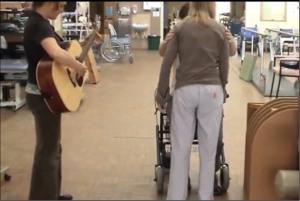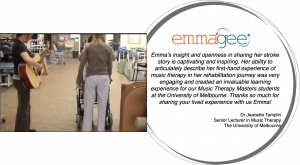 Music therapy opened up a whole new world for me. Music became a great comfort and another source of independence.
Music therapy opened up a whole new world for me. Music became a great comfort and another source of independence.
Music is definitely one area of my life I never thought I’d go on to explore, let alone benefit from. However, throughout my recovery it played a crucial role in reinventing myself. Not only did it facilitate my physical recovery, relearning how to breath and speak again, but it also unmasked the emotions that were trapped inside my body.
I write in my book about the emotional and physical benefits music had on my recovery.
“An early therapy I was really looking forward to was ‘hydro’ or warm water therapy. I secretly clung to the hope that the water would wash away my disability and my balance would be miraculously restored. First, though, I needed to improve my breathing and swallowing, as my medical team feared I would aspirate if I entered the water. So as well as my speech regime I was sent to music therapy. Yep, I had to sing to swim... In my former life as an OT I’d regarded music therapy as a bit of a ‘time filler’ but I soon learnt these sessions have surprising physical and emotional benefits”.
“… My body had basically forgotten how to breathe and at first I could only hold a note for less than a second. The music therapist, Tina, would sit at the piano and play a note and sing and I would try to copy her. I sounded awful and I mentally added ‘can’t sing’ to the long list of what I couldn’t do, but slowly the exercises restored some breath control and endurance”
The above footage captures me relearning to walk when I had music to assist me.
The healing power of music was incredible for me, especially earlier on when I couldn’t easily communicate. I could hear these lyrics and simultaneously, “… reconnect with and express trapped emotions…Missy Higgins’ ‘Nightminds’ was a particular favourite. The words I will learn to breathe this ugliness you see still give me chills…”
An added benefit was being able to refer to words in the lyrics to educate others around me. A way I could better articulate my needs and gain their understanding. To be able to point to “I’ve had a bad day…” to convey my feelings and save time and energy was phenomenal.
So, I never unleashed an incredible music talent after my stroke, In fact, I’m sure singing actually caused deafness amongst all the people within my rehab setting! However, it did develop a newfound appreciation for music therapy. It was said in my recovery that my walking improved with music. But the music therapist and my other team rarely liaised. I do wonder if more inclusion of different therapies would lead to a more collaborative, person-centred approach.
I continually benefit daily from the rhythm, cadence and meaning music plays weaved into my everyday life. Whether it’s classical music that helps create a calm environment when I’m writing, relaxing music when I’m doing yoga or meditation, more upbeat and rhythmical tunes when I’m walking or distraction from my monotonous rehab.
 I recently worked with a group of Music Therapy Students at The University of Melbourne which encouraged me to reflect more on the importance this discipline.
I recently worked with a group of Music Therapy Students at The University of Melbourne which encouraged me to reflect more on the importance this discipline.
Consider, what areas or therapies that you could incorporate into your services or care to improve the overall outcome!